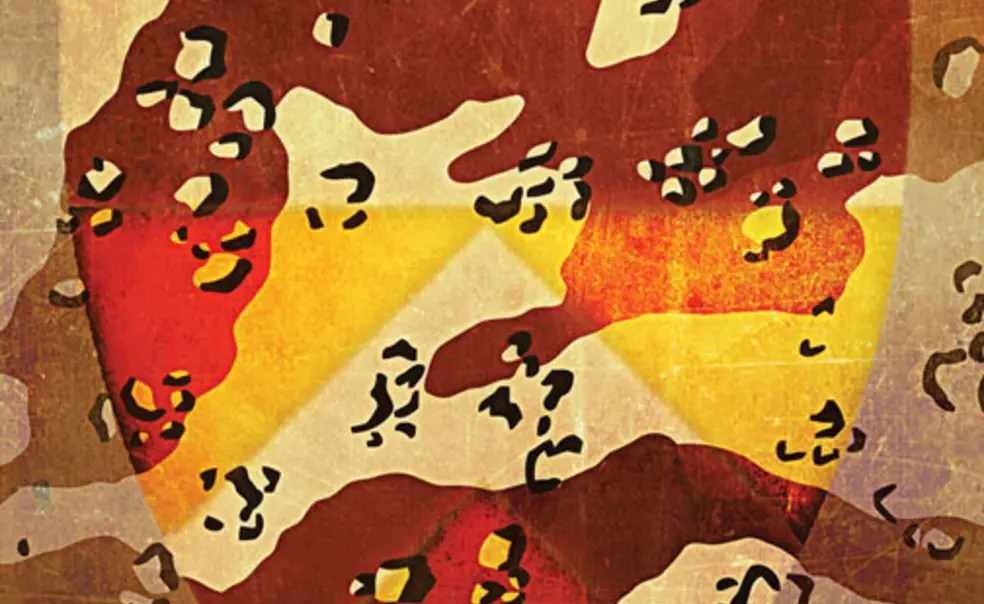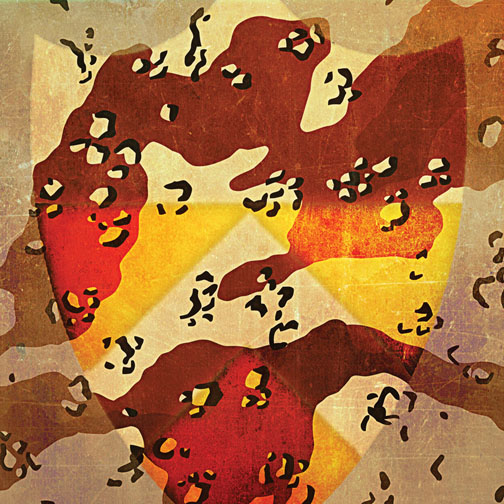Nate Rawlings ’04, a captain in the U.S. Army, wrote this essay shortly before returning from his second tour of duty in Iraq, where he led a platoon in combat in Baghdad and was an embedded combat adviser to the Iraqi Army. In the fall, he will begin graduate studies in journalism at Columbia University.
I was a wrestler at Princeton, and before each home match I’d take a moment to stare at three crude, small statues flanking the front doors in the lobby of Dillon Gym. The sculptures depict runners passing a baton; they were meant to remember the University Gymnasium fire of 1944. Trophies from decades of athletic achievement were lost in the blaze, and the University forged the small athletes from the trophies’ melted remains. A small plaque reads, “Their mute eloquence proclaims that no victory won for Princeton will ever be forgotten.”
Pausing to study the statues always calmed my pre-match nerves; the tiny sprinters reminded me that any achievement by a member of the Princeton community would be celebrated and that Princetonians always would remain connected.
In ROTC I studied war, but no level of study prepared me for the realities of combat. Iraq was a filthy, unforgiving place. I arrived in 2005 to see thousands of people living in squat, brown buildings webbed with wires that carried no electricity, the space between the apartment blocks and the streets riddled with garbage. In my first tour, I led a scout platoon charged with hunting insurgents who had planted roadside bombs. We lost 18 friends that year; four were killed in a single day when they drove over a buried explosive.
Bonds to my life at Princeton helped to sustain me. Soon after arriving in Iraq, I noticed that when West Point officers encountered fellow alumni — even former teammates and roommates — they rarely paused for more than a quick hello. Though nearly all recounted happy memories of their alma mater, few West Pointers said they longed for their undergraduate experience, as I did.
In stark contrast, every gathering of two Princeton alumni in a combat zone became a small reunion. Princetonians went out of their way to meet each other in person, hitching rides on convoys or helicopters and crossing large bases to meet for lunch or dinner. E-mails traveled quickly across Iraq and Afghanistan when alumni arrived in the Middle East. During Reunions, Princetonians in Iraq sought each other out — and some succeeded in celebrating together even though they could not be on campus.
One afternoon during my first deployment, a friend who was working for the CIA picked me up to take me to dinner at his base in Baghdad. For four months, I had traveled only in a Bradley Fighting Vehicle or Humvee; the only cars I’d seen were dented Opels and dilapidated pickup trucks filled with fruit or vegetables. My friend drove a new Mercedes-Benz outfitted with heavy armor — that odd sight alone made me laugh until my ribs hurt — and as we traveled to his base, we spoke about mutual friends who had married or taken new jobs, about crazy nights on Prospect Avenue, about our former lives and our current ones. We talked about Iraq: It was just weeks after the bombing of the sacred Golden Mosque in Samarra, which ignited the sectarian war that raged for the next year, and my friend helped me understand how that bombing, 100 miles north, would change the way I’d do my own job. Mostly, seeing a familiar face amid the misery of Baghdad reminded each of us that there were better places waiting for us when we would return home.
The Princetonians I met in Iraq were not my closest friends on campus — not the roommates I had lived with, not my wrestling or rugby teammates, not my clubmates at Tiger Inn. Our most powerful connection was our shared connection to Princeton — a place that made us a family the moment we arrived on campus. That was enough for us to travel across war-torn streets just to see each other.
More than a year ago, just before I went to Iraq for a second tour of duty, Pat Donohue ’03 returned home from his own service there. Then, last June, as the Iraqi heat grew unbearable and daily foot patrols proved torturous, a package arrived from Cambridge, Mass. It was from Pat — someone who had walked where we were walking, and knew what we needed. My troops and I devoured the snacks he sent and spent hours watching his DVDs.













No responses yet